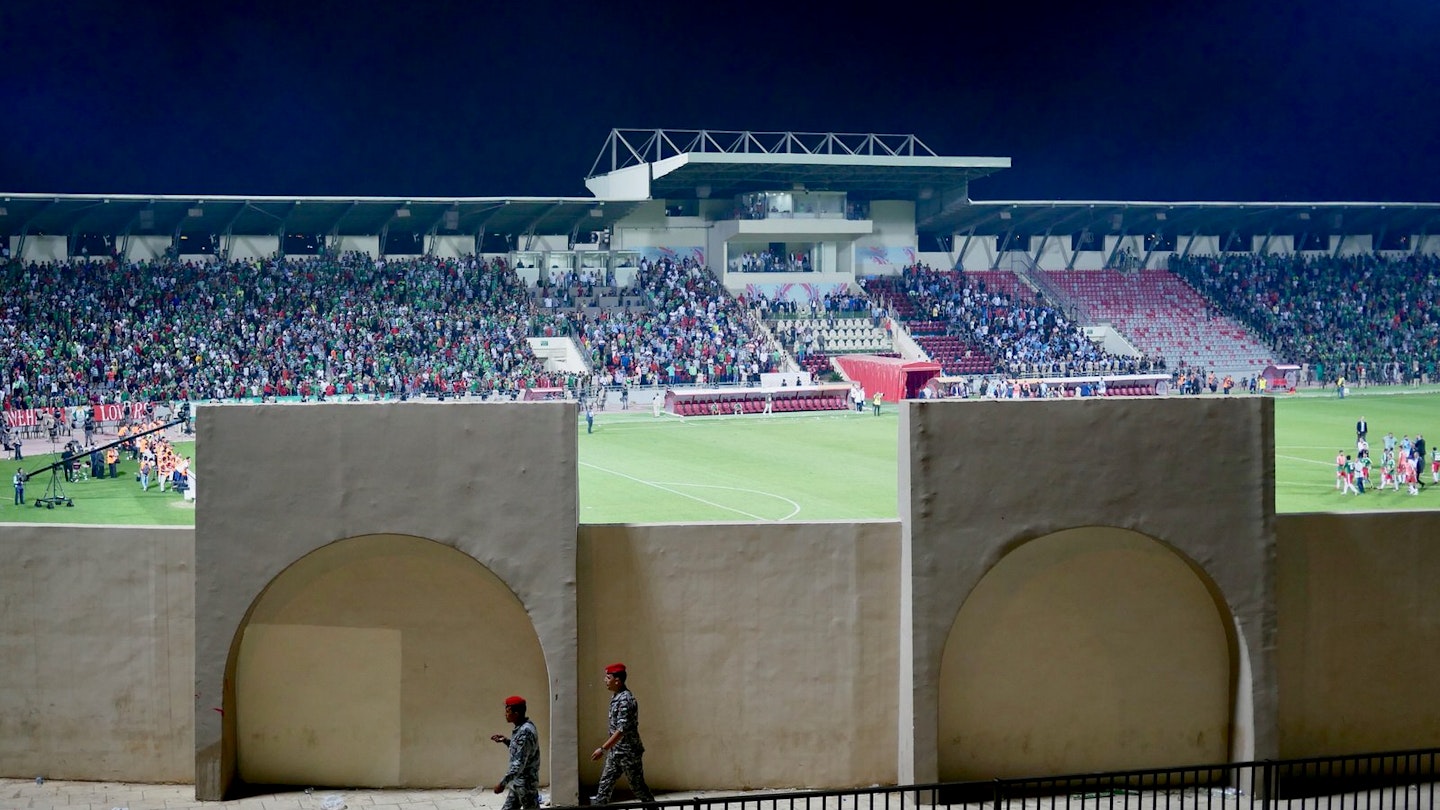Share
Nov 15, 2018 • 8 min read

The intense rivalry or feud between Al Wehdat and Al Faisaly, Jordan’s premier football clubs, is steeped in history and identity. Al Wehdat, which began in a refugee camp in southeast Amman, embodies the pride of the Palestinian diaspora. On the other hand, Al Faisaly represents traditional Jordanian support and is the most successful club in the nation. Witnessing this rivalry at a football match offers an insightful window into the socio-political dynamics of the region.
As I strolled towards the King Abdullah II stadium complex, I observed a silver car adorned with Wehdat flags speeding past. Later that evening, locals gathered at cafes, excitedly tuning in to the match as I rode a taxi southeast, taking in the vibrant hues of Amman’s sunset angling over its rolling hills.
Once at the stadium, the atmosphere shifted dramatically. Armoured vehicles lined the street, and security personnel scrutinised tickets and bags, ensuring safety for all attendees. These precautions serve as a reminder of previous incidents of violence and unrest surrounding matches, notably in 2009 when a game was abandoned due to rioting.
A Fractured History
The rivalry transcends mere sport; it encompasses deep-rooted historical grievances, stemming from the complex fabric of Jordanian and Palestinian histories. The UN Relief and Works Agency for Palestine Refugees (UNWRA) established the Al Wehdat Sports Club in the wake of the 1948 Arab-Israeli War, affirming its importance in the Palestinian narrative. Conversely, Al Faisaly’s support is primarily rooted in the ‘East Bank’ Jordanians, leading to friction among fans.

As tensions rise, passionate chants erupt. At one point, Al Faisaly fans derogatorily reference Queen Rania’s Palestinian ancestry, while Al Wehdat loyalists proclaim their connection to Arab Jerusalem. In 2017, the Jordanian Football Association had to take disciplinary action against both clubs for using discriminatory chants, illustrating just how charged the atmosphere can become.
Kickoff
Upon my arrival, the game had already commenced. Moving through security, I was enveloped in a vibrant cacophony as the stadium, primarily decorated in green, white, and red, represented the Palestinian flag colors. The crowd was exuberant and electric, further amplified by the physicality of the players on the pitch.
Amid the excitement, I noted that my fellow spectators, including families with children, seemed to balance the thrill of the game with personal joys, like glimpses of playful interactions amidst the vibrant matchday atmosphere.

Halfway through the match, a group near me performed the evening prayers while the game continued. Such moments exemplified the reverence and culture surrounding not just the sport but the traditions of those in attendance. The roaring crowd erupted again as the referee awarded a free kick to Faisaly, illustrating the intense emotions tied to every decision made on the field.

‘No Time for Mistakes’
As halftime approached, the score remained level. A man next to me playfully adorned my head with a ribbon inscribed with ‘Al Wehdat SC, Club of Champions,’ whereupon we shared conversations about football, culture, and politics in the region. Just moments after the break, Wehdat fans launched their banner, igniting a surge of excitement as they linked arms, creating a sea of solidarity in their support.
This shared experience illustrated the power of community—despite the complexities surrounding the teams, attendees rallied together in support of their respective clubs. Even while I felt like an outsider amidst the fervor, I was welcomed and embraced within this enthusiastic and passionate crowd.

As the game advanced, frustration mounted on the pitch. Tensions between players culminated in a scuffle, while the fans roared in response. Just when Wehdat appeared close to scoring, a missed opportunity left the crowd gasping, showcasing the raw emotions tied to the outcome.
Full Time
With just minutes left, I opted to leave early, advised to vacate before tensions inflamed. Venturing toward the exit, I caught the final moments of the game through a gap in the gate. When the whistle blew, confirming a goalless draw, the aftermath erupted into chaos with heated exchanges between players and supporters.
The rivalry extends beyond the pitch, deeply entwined in the identities of Jordanians with Palestinian heritage. Al Wehdat embodies their cultural roots, making every match more than just a sporting event; it’s a profound display of identity and belonging, especially for those residing in the Al Wehdat refugee camp.
As I made my way uphill towards my taxi, I reflected on the night and how the glowing stadium lights slowly faded into the distance, leaving echoes of football chants in their wake.

Attending a Match
While in Amman, you can acquire tickets to a match starting from JD3 (around US$4.20). Tickets can be purchased from the stadium ticket booth either the day before or on the match day itself. ‘First class’ tickets are available for JD4 (approximately US$5.60), providing access to a more family-oriented stand that is typically safer. The most premium tickets, located near the commentary position, are JD10. You can easily find the match schedule with a quick online search.
However, it is essential to understand that altercations sometimes occur between Al Wehdat and Al Faisaly supporters, making attending matches potentially risky. Thus, leaving the stadium a bit before the conclusion of the game is advisable, and visitors should avoid wearing either team’s colors. Additionally, visitors should refrain from consuming alcohol near the stadium, given that the Al Qweismeh area is more conservative compared to western Amman.
Taxis to the King Abdullah II stadium typically cost no more than US$5. It is crucial to allow sufficient time for travel as traffic in Amman can be particularly congested during rush hour.





